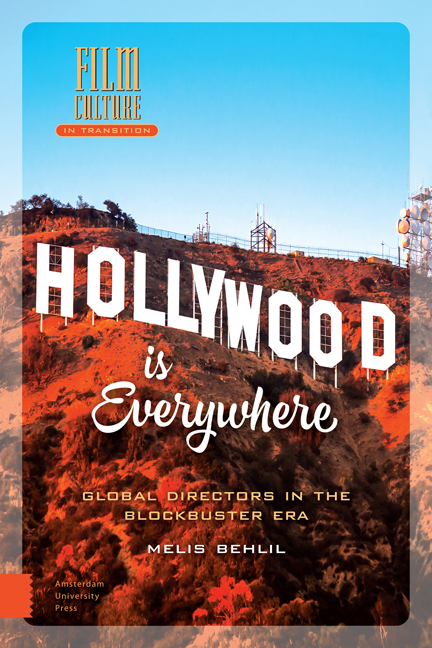Book contents
- Frontmatter
- Dedication
- Contents
- Acknowledgments
- Introduction: Hello Hollywood
- 1 Defining Hollywood
- 2 Cultural Work in a Globalizing World
- 3 Histories and Geographies of Global Directors
- 4 A View to a Franchise: James Bond
- 5 “Once More with the Volume Up”: Auto-remakes
- 6 I Want My MTV: Advertising and Music Videos
- 7 Conclusion: “Everywhere is Hollywood”
- Notes
- Bibliography
- List of Directors
- Index of Film Titles
- Index of Names
- Index of Subjects
- Film Culture in Transition
7 - Conclusion: “Everywhere is Hollywood”
Published online by Cambridge University Press: 10 December 2020
- Frontmatter
- Dedication
- Contents
- Acknowledgments
- Introduction: Hello Hollywood
- 1 Defining Hollywood
- 2 Cultural Work in a Globalizing World
- 3 Histories and Geographies of Global Directors
- 4 A View to a Franchise: James Bond
- 5 “Once More with the Volume Up”: Auto-remakes
- 6 I Want My MTV: Advertising and Music Videos
- 7 Conclusion: “Everywhere is Hollywood”
- Notes
- Bibliography
- List of Directors
- Index of Film Titles
- Index of Names
- Index of Subjects
- Film Culture in Transition
Summary
Steve Erickson's novel Zeroville, about a “cineautistic” editor in Hollywood in the 1970s, is very much about filmmaking and the industry itself. One of the main characters in the book, who is in Spain, shooting a film set in Morocco, observes: “It's all Hollywood, everywhere is Hollywood, the only place on the planet that's not Hollywood anymore is Hollywood.” The scene takes place at the beginning of the New Hollywood era. If anything, shooting and even post-production have been dispersed more widely around the world since then, and now “everywhere is Hollywood” indeed. “Hollywood” is no longer a locative signifier; it denotes complex global networks of media production and distribution.
Earlier in this book, I argued that Hollywood is not American. While reiterating this argument, and noting that it is somewhat hyperbolic, I also questioned why this matters, or whether it matters at all. Barry Langford, who has asked the same question, rightly points out that it depends on where one is standing; and that when viewed from overseas, Hollywood’s “American-ness” is often a cause for concern. This concern is very much one about cultural homogenization, often with a focus on global brands such as McDonald’s. But nearly all of the brands that dominate the world’s high streets belong to transnational corporations, and are not necessarily American. In fact, McDonald's itself is a publicly traded company that operates in over a hundred countries, where the restaurants may be run by the corporation itself, its affiliates or franchises. The company has a mixed record on labor, environmental, and health issues, but the same could be said of many transnational corporations.
Hollywood, as the dominant power in world cinema, is criticized for its hegemony over other filmmaking cultures, co-opting talented personnel and exploiting cheaper labor in local film industries. While this is largely true, this does not mean that Hollywood is American, but that it is driven by the capitalist-consumerist logic that is the prevailing ideology in the world today. In fact, making “Americanization” into the central issue and demonizing “the American film industry” without paying attention to the underlying financial conditions shift the focus from the significance of transnational corporations’ role in the global system.
- Type
- Chapter
- Information
- Hollywood is EverywhereGlobal Directors in the Blockbuster Era, pp. 125 - 130Publisher: Amsterdam University PressPrint publication year: 2016



